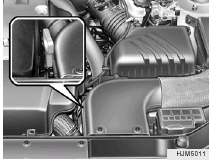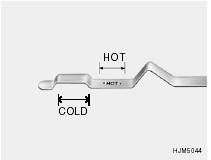 Hyundai Tucson: Checking the transaxle fluid (automatic)
Hyundai Tucson: Checking the transaxle fluid (automatic)
Transaxle fluid in the automatic transaxle should be checked at those intervals specified in the vehicle maintenance schedule in Section 5.
NOTE: Automatic transaxle fluid is basically red color. As driving distance increases, the fluid color turns darkish red gradually. It is a normal condition and you should not judge the need to replace based upon the changing color. You must replace the automatic transaxle fluid in accordance with intervals specified in the vehicle maintenance schedule in section 5.
Recommended Fluid
Your Hyundai automatic transaxle is specially designed to operate with HYUNDAI GENUINE ATF SP III, DIAMOND ATF SP III, SK ATF SP III or other brands meeting the SP III specification approved by Hyundai Motor Co.. Damage caused by a nonspecified fluid is not covered by your new vehicle limited warranty.
CAUTION: Use of aftermarket ATF additives may cause damage to the automatic transaxle. Only use HYUNDAI GENUINE ATF SP III, DIAMOND ATF SP III, SK ATF SP III or other brands meeting the SP III specification approved by Hyundai Motor Co.. If you are having your vehicle serviced at a facility other than a Hyundai dealer, verify that the correct ATF is used for your vehicle.
Transaxle Fluid Capacity
The fluid capacity of the automatic transaxle is 8.2 U.S. quarts (7.8 liters).
WARNING: The transaxle fluid level should be checked when the engine is at normal operating temperature. This means that the engine, radiator, exhaust system etc., are very hot so you should exercise great care not to burn yourself during this procedure.
 Checking the Automatic Transaxle Fluid Level
Checking the Automatic Transaxle Fluid Level
The automatic transaxle fluid level should be checked regularly. Keep the vehicle on the level ground with the parking brake applied and check the fluid level according to the following procedure. 1. Place the shift lever in N (Neutral) position and confirm the engine is running at normal idle speed. 2. After the transaxle is warmed up sufficiently (fluid temperature 158~176°F), for example by 10 minutes usual driving, move the shift lever through all positions then place the shift lever in N (Neutral) or P (Park) position.

3. Confirm if the fluid level is in “HOT” range on the level gauge. If the fluid level is lower, add the specified fluid from the fill hole. If the fluid level is higher, drain the fluid from the drain hole. 4. If the fluid level is checked in cold condition (fluid temperature 68~86°F), add the fluid to the “COLD” line and then recheck the fluid level according to the above step 2.
WARNING: The cooling fan is controlled by engine coolant temperature and may sometimes operate even when the engine is not running. Use extreme caution when working near the blades of the cooling fan, so that you are not injured by a rotating fan blade. As the engine coolant temperature decreases, the fan will automatically shut off. This is a normal condition.
 Checking the transaxle oil (manual)
Checking the transaxle oil (manual)
Transaxle lubricant in the manual transaxle
should be checked at those intervals specified
in the vehicle maintenance schedule in Section 5.
Recommended Oil
Use only HYUNDAI GENUINE PARTS MTF ...
 Checking the brakes
Checking the brakes
CAUTION:
Because brakes are essential to the safe
operation of the car, it is suggested that
they be checked and inspected by your
Hyundai dealer. The brakes should be
checked and inspected ...
See also:
Automatic air conditioner
1. Air flow control dial
2. Temperature control dial
3. Fan speed control dial
4. Rear window defroster button (See “Rear window and outside mirror defroster
switch” in the “2. Instrum ...
Battery
WARNING - Battery dangers Always read the following instructions carefully when
handling a battery. Keep lighted cigarettes and all other flames or sparks away
from the battery. Hydrogen, a highly ...
To Stop Playing Your iPod
To play the radio, press the AM/FM
button or touch the FM1, FM2, AM,
XM1, or XM2 icon. Touch the CD
icon to switch to the disc mode (if a
disc is loaded). Each time you press
the CD/XM butto ...
